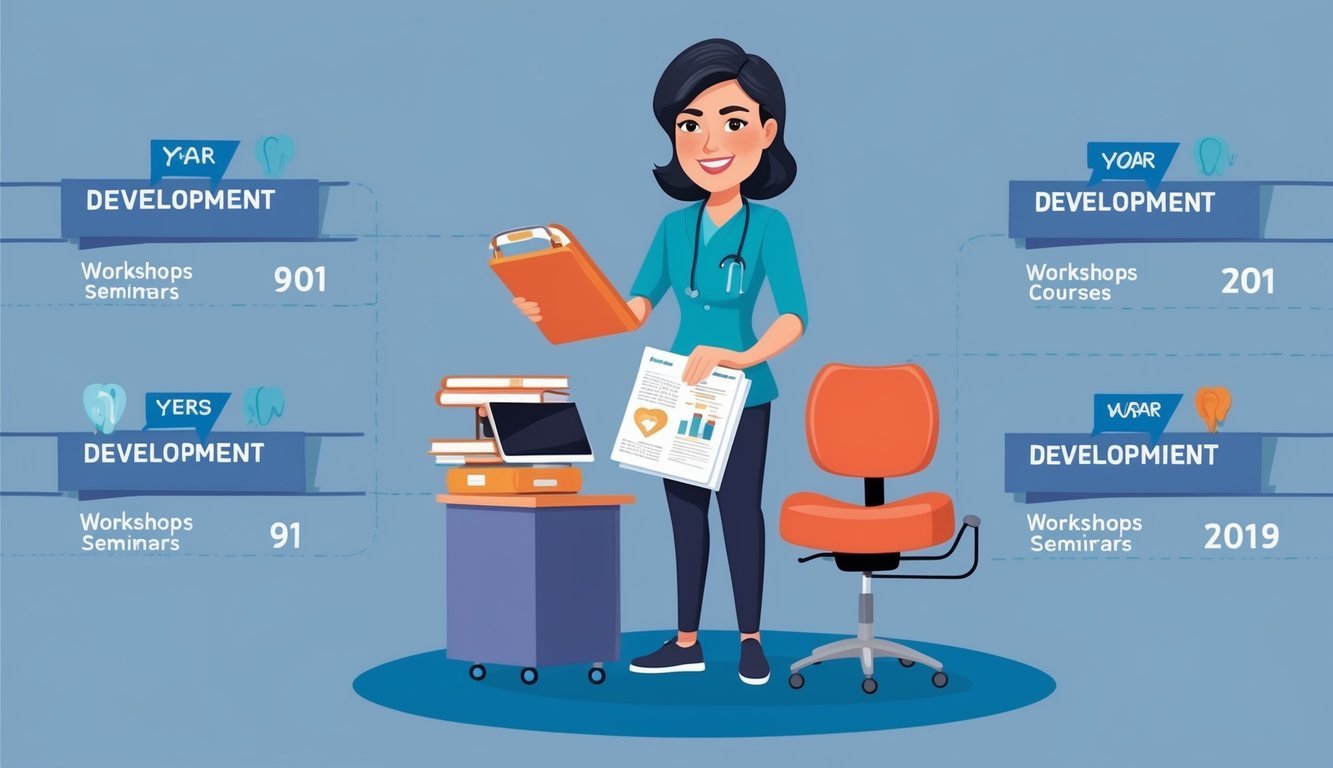Becoming a dental hygienist is an appealing career choice for many who are interested in oral health and patient care. It typically takes between two and four years to become a dental hygienist, depending on the level of education you pursue. With a growing demand for dental professionals, this career path can offer not only job stability but also the potential for a rewarding salary.
You can start your journey by enrolling in an associate degree program, which usually takes about two years to complete.
Alternatively, if you opt for a bachelor’s degree, you may spend up to four years in school.
Regardless of the path you choose, it’s essential to meet licensing requirements set by your state to practice legally as a dental hygienist.
Understanding the educational timeline can help you plan your career effectively.
By exploring your options, you can make informed decisions that align with your personal and professional goals.
For more insights on the steps to becoming a dental hygienist, check out this comprehensive guide on how to become a dental hygienist.
Path to Becoming a Dental Hygienist
To pursue a career as a dental hygienist, you should first focus on the educational requirements and then carefully select an accredited program.
These steps are crucial for obtaining the necessary qualifications and gaining the skills needed in the field.
Educational Requirements
The typical educational path for a dental hygienist begins with earning an associate degree in dental hygiene.
You can complete this degree in about two years at community colleges or universities.
During this time, coursework will cover subjects like oral anatomy, patient management, and periodontology.
Some professionals opt for a bachelor’s degree, which may enhance job opportunities and potential earnings.
A bachelor’s program usually requires an additional one to two years.
For those interested in teaching or administration roles, advancing to a master’s degree can be beneficial.
Once you have completed your education, you will need to pass the National Board Dental Hygiene Examination to practice professionally.
There are also state-specific licensing tests you must meet.
Accreditation and Program Selection
When selecting a program, ensure it is accredited by the Commission on Dental Accreditation (CODA).
Accredited programs meet essential educational standards, which is vital for your future licensure.
You have options between traditional and online dental hygiene programs.
Online formats provide flexibility, but they must still be accredited and often require on-site clinical practice.
Consider the program’s curriculum, student support, and job placement rates.
Research various dental hygiene programs from community colleges and universities to find the best fit for your career goals.
Selecting a high-quality program will help you succeed in your future career as a dental hygienist.
Licensure and Certification

To practice as a dental hygienist, you must obtain the necessary licensure and certification.
This process typically involves passing several key examinations and fulfilling ongoing education requirements.
National and State Examinations
To become a registered dental hygienist (RDH), you must first pass the National Board Dental Hygiene Examination (NBDHE).
This exam assesses your knowledge of dental hygiene concepts and practices.
You can find more information about the exam here.
After passing the NBDHE, you are required to take a clinical board examination.
Each state has specific testing requirements governed by the state dental board.
This examination evaluates your clinical skills and patient interactions.
Make sure to graduate from an accredited program, pass the NBDHE, and complete your state’s clinical board exam.
Ensuring you meet all requirements set forth by your state is essential for securing your dental hygienist license.
Maintaining Licensure
Once you obtain your dental hygienist license, maintaining it is crucial.
Most states require you to complete continuing education (CE) courses regularly.
The specific number of hours varies by state.
Additionally, you must stay informed about any changes in laws or regulations that affect dental hygiene practice.
Continuing education can include workshops, online courses, and refresher courses relevant to the field.
Keep track of your CE credits to ensure compliance with your state dental board requirements.
This will help you maintain your status as a licensed dental hygienist and uphold the standards of care within the profession.
Clinical Skills and Patient Care

In dental hygiene, mastering clinical skills and providing exceptional patient care are vital for success.
These competencies ensure that you can effectively assess, educate, and treat patients, ultimately promoting better oral health.
Core Competencies
As a dental hygienist, you will need to develop several core competencies essential for effective care.
These include:
-
Communication Skills: You must convey information clearly to patients regarding their oral health and treatment options. This builds trust and encourages compliance with care plans.
-
Manual Dexterity: Precision is crucial in your work, particularly when performing tasks like scaling and polishing teeth. Developing fine motor skills will enhance your efficiency and effectiveness.
-
Clinical Assessments: You will conduct thorough examinations and take detailed medical histories. This information aids in identifying potential health risks and tailoring treatment.
These competencies form the foundation for providing high-quality patient care in the dental setting.
Specialized Procedures
In addition to core competencies, dental hygienists also perform specialized procedures that are critical for effective patient care.
Key areas include:
-
Local Anesthetic Delivery: Proficiency in administering local anesthetics is vital for patient comfort during procedures. Understanding anatomy and dosage calculations is necessary.
-
Periodontal Treatments: You will engage in scaling and root planing, vital for treating gum disease. This requires a comprehensive understanding of periodontal health and specific techniques.
-
Patient Education: You will educate patients on proper oral hygiene practices and dietary recommendations to promote long-term health.
These specialized skills enable you to provide comprehensive care and support to your patients, making a significant impact on their oral health.
For further reading, consider resources such as the American Dental Hygienists’ Association.
Employment and Career Prospects

The employment landscape for dental hygienists is promising, with numerous job openings projected in the coming years.
As a licensed professional, you will find various opportunities in dental offices and related healthcare settings.
Job Outlook and Opportunities
Employment of dental hygienists is expected to grow significantly, with a projected increase of 9% from 2023 to 2033.
This pace is much faster than the average for all occupations.
Opportunities are plentiful, with about 16,400 openings anticipated each year.
Many of these openings will arise from the need to replace those who retire or switch careers.
This demand reflects the growing emphasis on oral health and preventive care.
Dental hygienists often work alongside dental assistants and dental therapists, enhancing patient care in dental offices.
Advanced Career Paths
As you gain experience as a dental hygienist, several advancement opportunities may become available.
You might consider roles such as a dental hygiene educator, public health hygienist, or even a practice manager.
Some professionals pursue advanced education, specializing in areas like periodontal therapy or restorative dentistry.
Potential Career Paths include:
- Dental Hygiene Educator: Teaching at community colleges or universities.
- Public Health Hygienist: Focusing on community health initiatives.
- Clinical Coordinator: Overseeing dental hygiene programs in clinics.
These roles often come with higher salaries, potentially reaching $81,400 or more, depending on location and experience.
Exploring continuing education will keep you competitive in this evolving field.
Continued Professional Development

As a dental hygienist, continued professional development is essential for advancing your career and maintaining your licensure.
Engaging in various educational activities can keep you informed about the latest practices in oral healthcare.
Continuing Education
Most states require dental hygienists to complete continuing education (CE) credits for licensure renewal.
This often includes:
- Infectious disease control
- Practice management
- Risk management
Check your state’s specific CE requirements at ADHA.
Advanced Degrees
Pursuing an advanced degree, such as a Bachelor of Science in Dental Hygiene, can enhance your knowledge and improve job prospects.
Many programs offer courses in research, public health, and advanced clinical techniques.
Professional Conferences
Attending professional conferences allows you to network with peers and gain insights into emerging trends in dental hygiene.
These events often provide workshops and sessions on innovative practices.
Specialty Practice
Consider specializing in areas like pediatric dentistry, periodontics, or orthodontics.
Advanced training in these fields can boost your expertise and career options.
Dental Hygiene Schooling
Revisiting foundational concepts from your dental hygiene schooling can reinforce your knowledge.
Engaging in refresher courses or workshops can be beneficial.
Staying committed to your professional development is crucial for success in your career as a dental hygienist.

